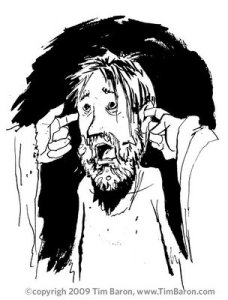 In the last article, I discussed the strange swearword ‘raca’ that turned up, or got edited out of, last Sunday’s Gospel from Matthew. In this morning’s Mass, the Daily Eucharistic Lectionary gave us Mark 8.22-26 for our Gospel. There’s not really much of a link between the two, apart from the spit.
In the last article, I discussed the strange swearword ‘raca’ that turned up, or got edited out of, last Sunday’s Gospel from Matthew. In this morning’s Mass, the Daily Eucharistic Lectionary gave us Mark 8.22-26 for our Gospel. There’s not really much of a link between the two, apart from the spit.
Today’s Gospel is the pericope of Jesus‘ healing of a blind man by putting his spit in his eyes. The healing takes two goes — first, the man sees people but they look like trees walking around. Characteristically for Mark’s Gospel, Jesus tells him not to tell. The spit, the walking trees and the messianic secret all add up to make a rather odd incident.
The oddness of this incident is one of the pieces of evidence that Mark’s is the earliest gospel. The three synoptic gospels — Matthew, Mark and Luke — share a lot of passages in common, some even verbatim, and often order this material in a similar way. Mark, being the shortest gospel, has parallel texts of almost every passage in either or both Matthew and Luke, so it seems that Matthew and Luke are based on Mark. Markan priority — the hypothesis that Mark’s Gospel was written first — is strengthened by the few scraps of Mark that do not appear in the other two. One of them is the spit-and-trees pericope above.
Another bit of unique Mark is the healing of a man who is deaf and mute in 7.31-37. In this healing, spit is involved once more and the people are ineffectively bound to silence again. In this healing, Jesus uses the word ‘Ephphatha‘ (εφφαθα) which is the Aramaic ethptaḥ (אתפתח or ܐܬܦܬܚ), which does mean exactly what the Greek gloss given by Mark’s Gospel says it means: ‘be opened’.
The third little bit of unique Mark is the reference, in 14.51-52, to the young man (νεανίσκος neanískos) who runs away naked, loosing the linen cloth wrapped round him, when he flees the garden where Jesus is arrested.
There are other things in Mark that are different — like an expanded account of the Gadarene swine (5.1-20) — but these three passages do not appear at all in the other gospels. The argument for Markan priority, is that it is far more plausible that writers who were using Mark’s Gospel as a source might decide that all this spit and streaking was unnecessary to the central message of the gospel and leave it out, rather than, if Mark is based on Matthew, and possibly Luke, it would omit all the great stuff in the sources and add these odd little stories.
I love this special treasury of stories from Mark’s Gospel. Their oddity is charming. Their rawness perhaps gets us closer to a ‘historical Jesus’.
